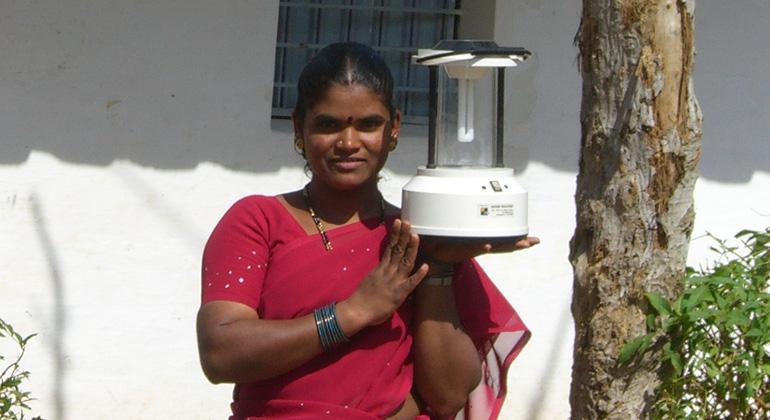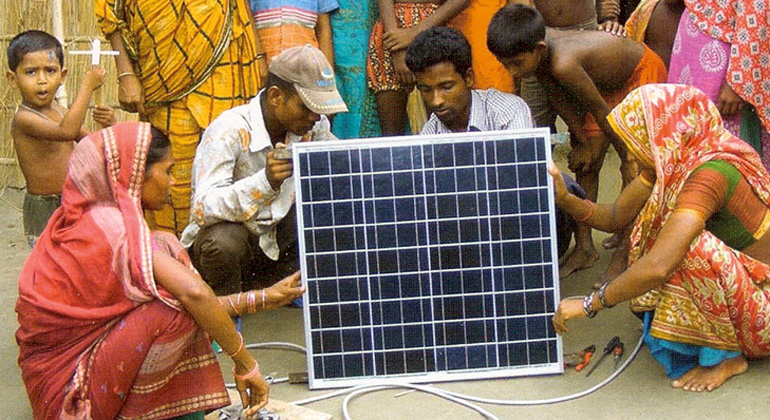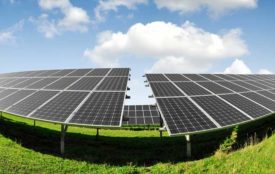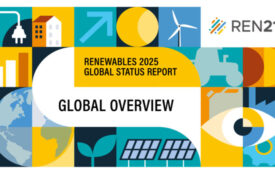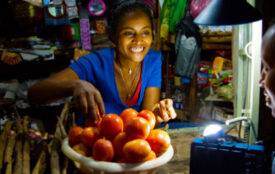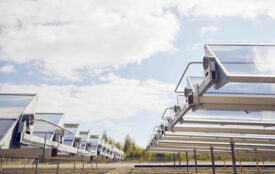How to meet the solar needs of the rural poor — 3 lessons learned
Recently, Global Partnerships and Solubrite, a solar distribution company in Nicaragua, worked together to organize a one-day workshop in Ocotal, a city in northern Nicaragua and home to GP’s partner, FUNDENUSE.
I attended the training to share with FUNDENUSE’s credit officers what we at Global Partnerships have learned during our two years of experience of working in the off-grid lighting space in Latin America.
The purpose of the workshop was to train FUNDENUSE’s credit officers in the technical aspects of solar products and share with them effective sales strategies to use when pitching them to their clients. Small solar lights and plug-and-play home systems are relatively new products to enter the market in Latin America. For the most part, they remain an unfamiliar technology to both the people living in off-grid communities as well as the credit officers that work with them. Facilitating this knowledge transfer and familiarizing the buyers and sellers of these solar products is integral to the development of this new sector in Latin America.
Observations from the training session
During the workshop, I led an exercise and had each credit officer in attendance write down several reasons why their clients do and do not want to buy a solar product.
Examples of reasons for solar
- To attain a higher standard of living
- Less harmful to your health
- To charge other electronics, such as a cell phone
- To save money
- Easy and practical to install and use
- To be able to work and study at night
Examples of reasons against solar
- Lack of ability to pay
- Limited capacity
- Lack of trust in quality and durability
Just from these several hours, we learned a few things about what drives demand for solar lights amongst poor, rural communities in Nicaragua.
1. Solar distributors should offer a range of products, from simple solar lamps to aspirational products like TVs.
- The first thing that rural customers want is a better light, and a solar lamp is as a cleaner and safer alternative to kerosene and candles. This is why we are supporting small light distribution, to build the early rungs of the energy ladder that enable rural families to begin climbing. And once they start climbing, people are interested in a solar product with additional functionality.
- Our experiences with Franco, one of FUNDENUSE’s solar clients, clearly illustrates this point. In his home, he has a Barefoot Connect 600, a small plug-and-play home system, which he uses to light up his house and charge his cell phone and portable DVD player. But not many people in his town in the mountains of northern Nicaragua can afford such a system. Understanding this constraint and yet wanting to spread solar technology in his community, Franco took out a loan to buy and resell five Sun King Mobiles, a solar lamp with phone charging capacity, to his friends and neighbors. Although his customers eventually want more lights and more solar power in their home, they all started with a smaller lamp. Solar distributors should be aware of this range of demand and capacity to pay and have the appropriate products available to offer their rural customers.
2. Poor customers want high-quality products
- Anecdotally, I’ve heard about how in Latin America, some people have had the misfortune of spending a lot to buy cheap products that broke down soon after. Whether this is true or not, people are wary of spending a lot of money on items that are “Made in China”. In fact, I wish I had a cordoba for each time I heard during the workshop, “It’s not a Chinese product.”
- To address this, the Solubrite trainer emphasized a clear distinction between generic, poorly-designed products made in China and high-quality products designed by international companies that are manufactured in China. Solubrite also spent considerable time convincing the credit officers of the durability and quality of these lights. This goes to show how rural Nicaraguans are looking for the highest quality product that will not break down and those who sell solar lamps to the BOP must be conscientious of the low confidence in the technology. Because even more so than the rest of us, the rural BOP cannot afford to purchase a cheap, flimsy product.
3. Seeing is believing
- During the workshop, credit officers explained that their job of promoting the solar lamps would be a lot easier if they could travel to the field with the lights and show, on the spot, the technology and product to their clients. This has to do with the relative novelty of solar lights. Credit officers want to give their clients the opportunity to see the light with their own eyes and feel it in their own hands. By doing so, they find that it is easier to interest and convince people of the benefits of solar energy.
Central to GP’s thesis of investing in last-mile partners is their access to rural, off-grid communities. By contributing to the training of FUNDENUSE’s credit officers, we ensure that the very people who are reaching these last-mile households are well educated about solar technology. It is also a great opportunity for us to learn from our partners’ challenges and collective experiences to further the goal of expanding solar energy in Nicaragua.
Agnes Cho is program associate at Global Partnerships
